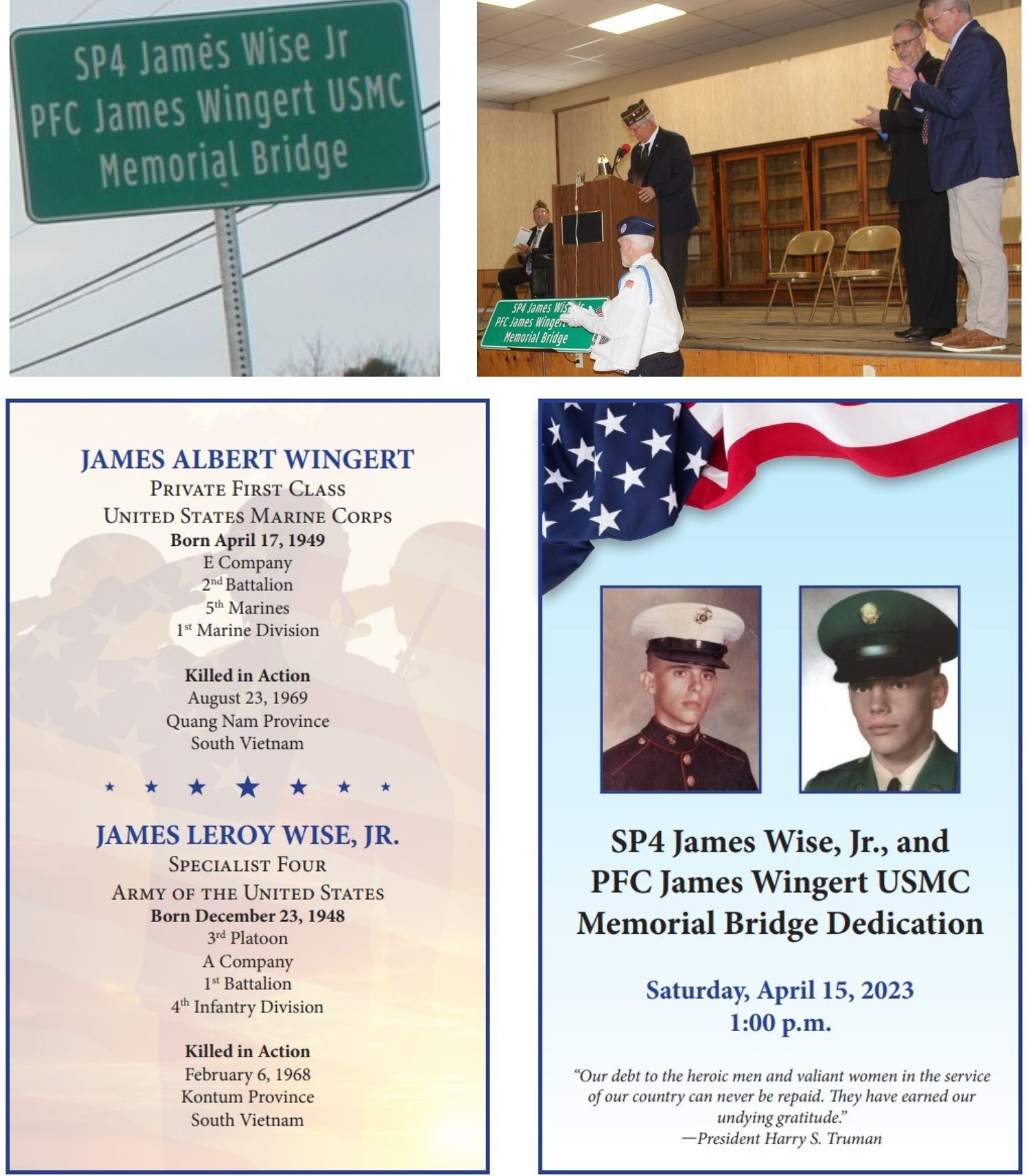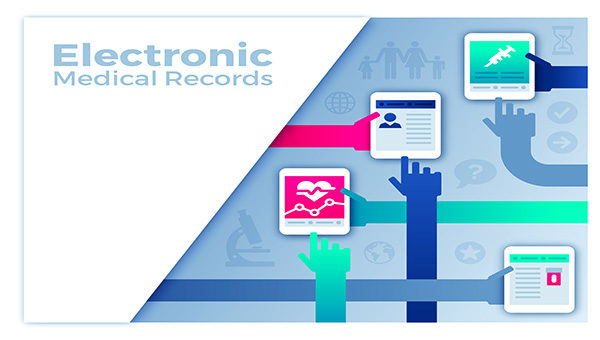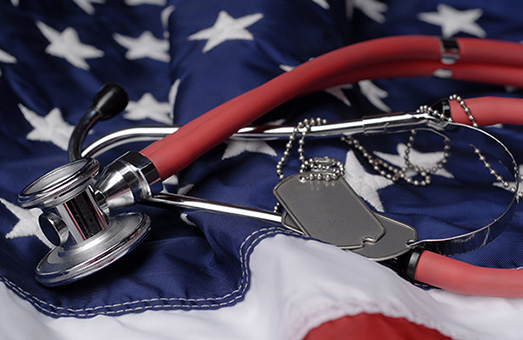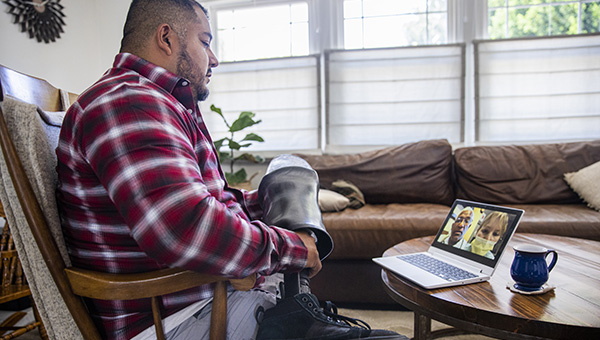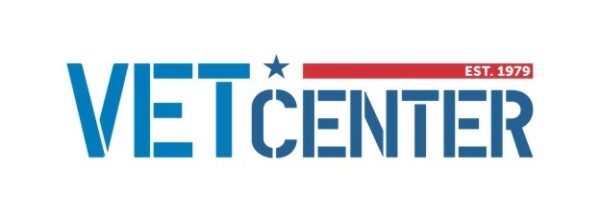
|
||||
|
In this Update:
Honoring All Who Serve
On April 15, I had the privilege of participating in the SP4 James Wise, Jr., and PFC James Wingert USMC Memorial Bridge dedication. James Wise Jr. and James Wingert grew up together as next-door neighbors in Big Run, before joining the military. They were both killed in action during the Vietnam War. More than a half-century after they made the ultimate sacrifice for freedom, their names have been permanently memorialized on the State Route 2003 bridge that crosses Mahoning Creek in Big Run. I am grateful to the families of both of these heroes for bringing their stories to me while still in the House. It took longer than it should have, but as the families and I discussed, there were some young people there who perhaps would not have been able to understand what we were doing to honor these men three years ago, but seemed to take it all in during this ceremony. It has often been said that the only thing worse than having no heroes is to have them and forget them. This ceremony helps to generationally pass on the legacy of these two heroes. The 25th Senatorial District definitely has no shortage of military heroes, and we remain committed to giving you all the recognition you so richly deserve for your service and sacrifice. VA Announces Reset of Electronic Health Record Project
The U.S. Department of Veterans Affairs (VA) has announced future deployments of the new Electronic Health Record (EHR) will be halted while the agency prioritizes improvements at the five sites that currently use the new HER, as part of a larger program reset. During this reset, the department says it will fix issues with the EHR that were identified during the recent “assess and address” period, continue to listen to veterans and clinicians about their experience with the EHR, and redirect resources to focus on optimizing the EHR at the sites where it is currently in use. The VA has said additional deployments will not be scheduled until the agency is confident the new EHR is highly functioning at current sites and ready to deliver for veterans and VA clinicians at future sites. According to the department such readiness will be demonstrated by: clear improvements in the clinician and veteran experience; sustained high performance and high reliability of the system itself; improved levels of productivity at the sites where the EHR is in use; and more. When these criteria have been met and the reset period concludes, the VA said it will release a new deployment schedule and restart deployment activities. The VA has indicated its goal for the new, modernized EHR is to provide meaningful improvement to veterans’ health outcomes and benefits decisions, with the department making clear it remains committed to successfully implementing the new system across the nation. VA, NIH Launch Study of Gulf War Illness
The VA and National Institutes of Health have begun a joint, five-year study that aims to explain the chronic symptoms of Gulf War Illness. According to those involved, the study may lead to more definitive diagnostic criteria for Gulf War Illness, development of new diagnostic testing and potential treatments. Gulf War Illness affects multiple systems in the body and includes chronic symptoms such as fatigue, headache, memory and cognitive difficulties, joint and muscle pain, poor sleep and problems with gastrointestinal and respiratory function. This disease affects about a third of the nearly 700,000 men and women who served in the Persian Gulf during operations Desert Shield and Desert Storm. You can read more about the new study here. DEAN is Meeting Veterans Where They are Through Health Care Innovation
Making health care more accessible is something we would all like to see occur, especially those of us living in rural areas where it may be difficult to find health care providers. For veterans, the VA’s Office of Discovery, Education, and Affiliate Networks (DEAN) seeks to ensure veterans have access to the most innovative health care solutions by promoting medical research initiatives, training health care professions and developing community partnerships. Meeting veterans where they are not only means transcending the physical boundaries of location and distance, but better understanding veterans’ experience of health and health care. DEAN, through its myriad programs and initiatives, is trying to do just that through health care innovations that let veterans be more independent. You can read more about those innovations – such as its virtual physical therapy program, the “DropEase” program and its Veteran eXpeRience events – here. VA’s Goal to Prevent and End Veteran Homelessness in 2023
For many veterans, their service to us and our nation comes with a heavy cost, making them more vulnerable to suicide, physical and mental illness, substance use disorders and homelessness. According to government statistics, on any given night, there are around 37,000 veterans experiencing homelessness across our country. Fortunately, that number has decreased by about 50% since 2009, but there are still so many still in need of help. Those who study and work with the homeless indicate homelessness is a dynamic situation: most folks who are homeless only experience homelessness for a fairly short period of time, so there’s a lot of turnover in the population. That’s why the VA has stated its goals for 2023 are:
You can read more about the VA’s goals to end veterans’ homelessness here. Paving Paths to Reentry for Homeless Veterans
A lack of stable housing is a well-documented risk factor for incarceration, and incarceration is a risk factor for homelessness. According to the VA, about half of all veterans enrolled in the department’s homeless programs have been involved in the justice system, and once a male veteran establishes a history of incarceration, they are 3.5 times more likely to experience homelessness, creating a dangerous cycle that can perpetuate and escalate if veterans do not receive the resources and support they need. To that end, the VA operates such things as the Veterans Justice Outreach, the Veterans Re-entry Search Service, the Health Care for Re-entry Veterans program and the Legal Services for Veterans program. You can read more about these programs and more supports here. My Recommended Read for Veterans in the Month of May: On Killing – The Psychological Cost of Learning to Kill in War and Society
From the book: “The good news is that most soldiers are loath to kill. But armies have developed sophisticated ways of overcoming that instinctive aversion. The psychological cost for soldiers, as evidenced by the increase in post-traumatic stress, is devastating. The psychological the psychological cost for the rest of us is even greater: contemporary civilian society, particularly the media, replicates the army’s conditioning techniques and directly contributes to our rising rate of violent crime, especially among the young. “This landmark study – now updated to encompass suicide bombings, school shootings, 21st century military conflicts, recent trends in crime, and more – brilliantly illuminates the techniques the military uses to help soldiers kill and raises vital questions about the implications of escalating violence in our society.” Of the books I’ve read, this is one I would recommend to those who have been in the position of where they took a life, and most definitely to those who are or expect to lead those who may be exposed to such necessity. I would also recommend it to members of the state and federal legislatures whose actions might lead to conflicts or who are making policy decisions about the violence in our society. Expertly researched and well written, this book will open the eyes of those who’ve never had to deal with such situations and hopefully provide a little insight, understanding and, I hope, some ability to come to peace with one’s actions for those who have taken a life in the protection of others. What are Vet Centers?
I’ve been asked this question by several of my fellow vets and feel it’s important to provide an answer to those who haven’t reached out yet. VA Vet Centers provide free and confidential readjustment counseling for War-Zone Veterans and their families, World War II to the current Global War on Terror. Vet Centers are small, non-medical, counseling centers conveniently located in our region. They’re staffed by highly trained counselors and team members dedicated to seeing you through the challenges that come with managing life during and after the military. Our region is served by the DuBois Vet Center, which is one of 12 Vet Centers in Pennsylvania and over 300 across the country. Whether you come in for one-on-one counseling or to participate in a group session, at Vet Centers you can form social connections, try new things, and build a support system with people who understand you and want to help you succeed. The Dubois Vet Center’ website is designed to provide veterans, family members, and community partners the ability to see what services the center offers, as well as the center’s Community Access Points with a picture of the entrance so first time visitors have a frame of reference to help guide them in. From my time in the State House through my current position, I’ve had a strong relationship with the Dubois Vet Center. They have helped me help many of my fellow vets. Two Recreational Therapy Groups Available at the Dubois Vet Center As part of a national competition, the DuBois Vet Center was approved for initial funding for two recreational therapy groups. One of the groups is an introduction to fly tying for fly fishing, with one of the center’s counselors being an avid fly tyer and fisherman. The other group is a no sew blanket group, which the center hopes will generate interest from women veterans, but the group is open to anyone who would like to join. The groups will be held at the Vet Center with approximately 4 cohorts to run quarterly with 6 vets in each cohort. The center says it hopes to grow these groups and potentially be able to have them at the center’s Community Access Points (CAPs) in McKean, Centre and Blair counties, with the possibility of adding more recreational therapy groups in the future. The center noted the initial funding will help them launch the groups, but they will be actively trying to obtain additional funding they can expand on them. Who is eligible to receive services at Vet Centers? Vet Center services are available to Veterans at no cost, regardless of discharge character, and without the need to be enrolled in VA health care or having a service-connected disability. If you are a Veteran or service member, including members of the National Guard and Reserve, you can access Vet Center services if you:
Contacting your local Vet Center Even if you are unsure if you meet the criteria to receive services from a Vet Center, please contact a center. From personal experience I can tell you that, if the center can’t help you, they’ll find someone who will. Center services are also available to family members when their participation would support the growth and goals of the Veteran or active-duty service member. If you consider them family, so does your local center. Bereavement services are also available to family members of Veterans who were receiving Vet Center services at the time of the Veteran’s death, and to the families of service members who died while serving on active duty. The DuBois Vet Center, located at 100 Meadow Lane, Suite 8, DuBois, PA 15801, can be contacted at 814-372-2095 or toll free 24/7 at 1-877-WAR-VETS (927-8387). The DuBois Vet Center recently announced counseling and referral services are now being provided at the State College American Legion Post 245, in addition to the many services they offer at their locations in DuBois, Altoona, Bradford, Penn State-DuBois, Smethport and their mobile Vet Center. The other Vet Center locations in Pennsylvania are:
For more information, please visit www.vetcenter.va.gov
For anyone who hasn’t already signed up to receive my mission reports, you can get on the e-newsletter mailing list here. |
||||
|
||||


2024 © Senate of Pennsylvania | https://senatordush.com | Privacy Policy |
